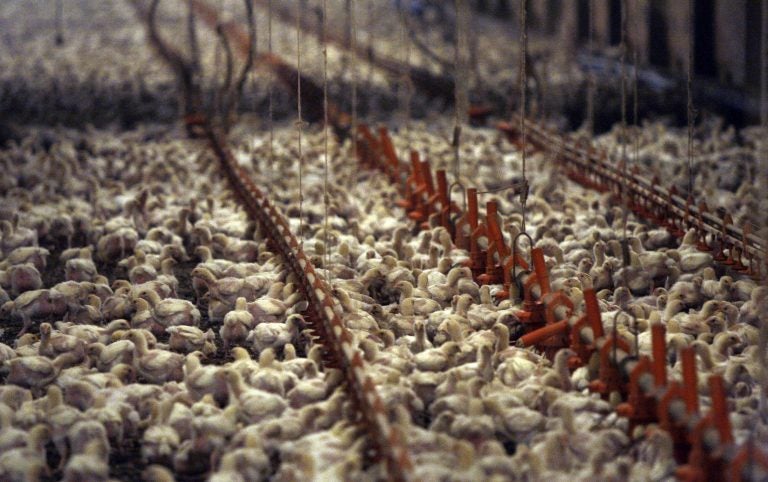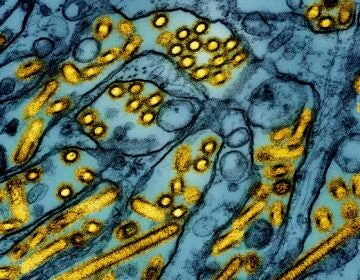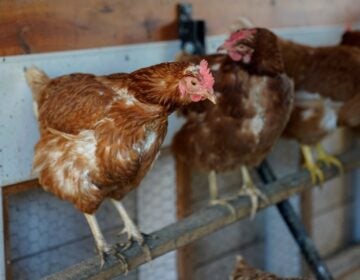Kent County, Del. chickens test positive for bird flu
More than 120,000 chickens on the farm were impacted by the outbreak, according to the Delaware Department of Agriculture.

This Dec. 2, 2008, file photo shows a chicken farm just outside the city limits of Pittsburg, Texas. (LM Otero/AP Photo, File)
This story is part of the WHYY News Climate Desk, bringing you news and solutions for our changing region.
From the Poconos to the Jersey Shore to the mouth of the Delaware Bay, what do you want to know about climate change? What would you like us to cover? Get in touch.
The sudden deaths of hundreds of commercial chickens on a farm in Kent County, Delaware were likely caused by the bird flu, according to the Delaware Department of Agriculture.
The birds tested positive for avian influenza at a University of Delaware lab. Samples were sent to the U.S. Department of Agriculture for further confirmation.
More than 120,000 chickens on the farm were impacted by the outbreak, according to the Delaware Department of Agriculture. The majority of those succumbed to the virus, while the remaining birds were euthanized to prevent the spread of disease, a spokesperson said.
The impacted area of the farm, which has not been named, has been quarantined.
The poultry industry is a major contributor to Delaware’s economy, with farms raising more than 200 million chickens a year. In 2022, Delaware’s chicken industry generated $5 billion in poultry sales.
“Highly pathogenic avian influenza (HPAI) can be very deadly to domestic poultry, so it is important to quickly stop the spread of the virus,” a spokesperson for the state said in an email.
“As a $5 billion industry, Delmarva has thousands of families that depend upon this business sector for their livelihoods. Strict biosecurity is essential to ensure the virus is not unknowingly transported from farm to farm.”
Rising concerns over bird flu
Avian influenza has been on the rise globally, including in the United States since 2020.
The bird flu is a highly contagious respiratory virus that can spread quickly among flocks of domestic and wild birds, and can also spread by infected equipment and clothing of caretakers.
Nearly 130 million chickens and other poultry have been impacted since the beginning of the current bird flu outbreak in 2022, driving egg prices to record highs.
In recent weeks and months, there have been numerous reports of outbreaks among wild birds and farm animals from Michigan, to Texas to Missouri.
Last week, Delaware announced positive cases among snow geese found at Prime Hook Beach. The public has reported more than 850 wild bird deaths, though the causes have not been confirmed and officials don’t know how many reports are duplicates.
There’s also increased concerns about the spread of bird flu among cattle, prompting the U.S. Department of Agriculture to test milk nationwide. Since March, there have been outbreaks among cattle in 16 states. States, including Delaware and Pennsylvania, have restricted the movement of dairy cattle and are testing their milk.
Last month, California Gov. Gavin Newsom declared a state of emergency after some of the state’s dairy cows contracted the disease.
On Thursday, the Biden administration set aside an additional $306 million to help combat bird flu.
Bird flu among humans
The risk to the general public is low, and there’s no human-to-human spread of the virus, according to the Centers for Disease Control and Prevention. However, alarms were raised after the agency confirmed the first severe case of H5N1 in a person who was exposed to sick and dead birds in Louisiana.
In 2024, there were 66 total confirmed cases of H5N1 bird flu among humans. Last month, a Delaware resident with unknown exposure tested positive for the virus at a local lab. However, secondary testing at the CDC could not confirm the results, according to the Delaware Division of Public Health.
Warning to Delaware farmers
The Delaware Department of Agriculture is reminding farmers the virus can spread from wild birds to poultry. They department believes the recent case in Kent County may have been introduced to the farm by wild birds. However, the investigation is ongoing.
“Poultry producers and backyard flock owners must realize that what occurs in wild birds does impact the health of their birds and that this is not only a problem along Delaware’s coast, which is where many of the reported dead birds have been located so far,” the department said in a statement.
The agency is urging farmers to keep their flocks away from wild birds, disinfect any equipment and footwear, avoid visiting other poultry farms and limit the movement of people or animals on their farms.

Get daily updates from WHYY News!
WHYY is your source for fact-based, in-depth journalism and information. As a nonprofit organization, we rely on financial support from readers like you. Please give today.






